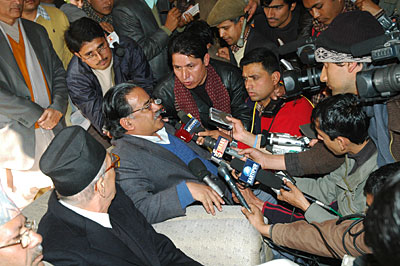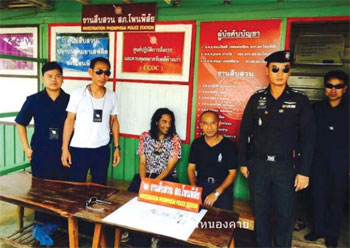Nepal Maoists seek to isolate king
Originally Published on news.bbc.co.uk
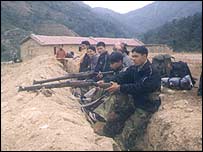 The unilateral ceasefire declared by Nepal’s Maoist rebels on Saturday is strategically timed and is intended to isolate King Gyanendra rather than help his government.
The unilateral ceasefire declared by Nepal’s Maoist rebels on Saturday is strategically timed and is intended to isolate King Gyanendra rather than help his government.
It comes in the wake of important meetings of the country’s two largest political parties, the Nepali Congress and the Nepal Communist Party (United Marxist-Leninist) (NCP-UML).
After the meetings, the parties decided to abandon their allegiance to a constitutional monarchy.
The statement by the rebel leader, Prachanda, said that with this change in stance, the possibility of forming an alliance with the parties had increased.
The declaration of ceasefire, therefore, is a clear attempt to woo the country’s two major political forces.
Petition
However, in an interview with the BBC, the general secretary of the NCP-UML, Madhav Kumar Nepal, said an alliance with the Maoists would only be possible if they declared their commitment to a multi-party system.
The stand of the Nepali Congress is the same.
A political analyst, and editor of Nepal magazine, Sudheer Sharma, says the aim of Prachanda’s statement is also to build public opinion against the opposition parties’ demand for the restoration of parliament.
Restoring parliament, which was dissolved by the king in 2002, has remained the main demand of the seven-party opposition alliance, which has been engaged in a nationwide movement against the king since his takeover in February.
In his statement, Prachanda said the restoration could not resolve the present crisis in the country.
The Supreme Court is currently considering a petition requesting the restoration of the House.
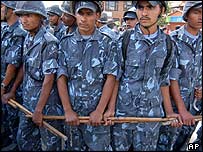 The Maoists fear that if parliament were restored by the court, that would break an impasse between the king and the political parties, bringing the parliamentary process back on track.
The Maoists fear that if parliament were restored by the court, that would break an impasse between the king and the political parties, bringing the parliamentary process back on track.
That would hamper the rebels’ attempts to link with the opposition political forces.
In the statement, Prachanda reiterated his party’s longstanding demand for an interim government and elections for a constituent assembly.
But rebel spokesman, Krishna Bahadur Mahara, said the interim government and the elections could only come after the toppling of the monarchy.
That appears unrealistic. The country’s security forces, so far, have demonstrated an unwavering loyalty to the king.
Momentum
Though there is a growing discontent among political parties and sections of the public to the king, he still exerts considerable influence on a large section of society.
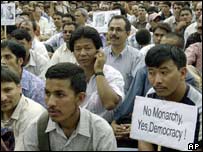 In a recent interview with the BBC, a member of the Royal Privy Council, former army chief, Sachit Shamsher Rana, said the opposition had been “appealing for people’s support for the past four years… but people are not coming out on the street because they support the king”.
In a recent interview with the BBC, a member of the Royal Privy Council, former army chief, Sachit Shamsher Rana, said the opposition had been “appealing for people’s support for the past four years… but people are not coming out on the street because they support the king”.
It may be an exaggeration to say people are not on the streets. Mass meetings and demonstrations are taking place regularly, especially in the capital, Kathmandu.
However, party leaders do acknowledge their movement has not yet gained enough momentum to bring about change.
However, that is no reason for the king and the royalists to rejoice.
In recent years, there has been a shift in public opinion on the question of monarchy.
The word “republic” was virtually limited to the dictionary until a few years ago; today, it is discussed and debated throughout the country.
It will be no surprise if the seven-party alliance, despite its current reservations, ultimately decides to work with the rebels in the absence of other options.
You can read more of Mishra’s column-essays on his three books, Raajnitisangai Raajkaaj, Khana Pugos Dina Pugos and Bhumadhyarekha. Please go to the BOOKS section to find out more about the books and where to purchase them.


